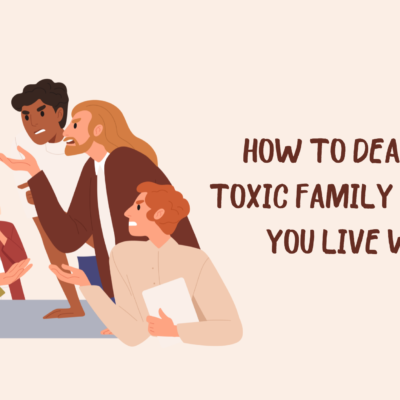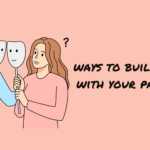How to Deal with Toxic Family Members You Live With: Living with toxic family members can be emotionally draining and mentally exhausting. Whether it’s constant criticism, manipulation, emotional abuse, or controlling behavior, toxic family dynamics can make daily life stressful. However, when you are living under the same roof, completely avoiding them is not always an option.
The key to maintaining your mental and emotional well-being is learning how to set boundaries, protect your peace, and develop coping strategies to handle difficult situations. This article explores practical ways to deal with toxic family members while living with them.
Also Read:
- How to Get Through a Breakup When You Live Together?
- How do You Forgive Someone who Continues to Hurt You?
Signs of a Toxic Family Member
Before learning how to deal with toxic family members, it’s important to recognize toxic behaviors. Common signs include:
- Constant Criticism: They belittle or demean you instead of offering constructive feedback.
- Manipulation: They use guilt, gaslighting, or emotional blackmail to control you.
- Lack of Boundaries: They invade your privacy, make unreasonable demands, or disrespect your personal space.
- Blame-Shifting: They never take responsibility for their actions and always blame others.
- Passive-Aggressive Behavior: They use sarcasm, silent treatment, or indirect hostility.
- Emotional or Verbal Abuse: They yell, insult, or undermine your self-esteem.
- Negativity and Drama: They always bring negativity into conversations and create unnecessary conflicts.
If you recognize these patterns in your family members, it’s time to take steps to protect yourself.
1. Set and Enforce Boundaries
One of the most effective ways to deal with toxic family members is by setting clear boundaries. Boundaries help you protect your mental and emotional well-being.
How to Set Boundaries:
- Be Clear and Firm: Politely but firmly communicate what is acceptable and what is not.
- Example: “I don’t appreciate being spoken to that way. If you continue, I will walk away from this conversation.”
- Limit Personal Sharing: Avoid sharing too much personal information with toxic family members, as they may use it against you later.
- Reduce Interaction: Keep interactions brief and to the point to avoid unnecessary conflicts.
- Create Physical Space: If possible, have a private space where you can retreat when things get overwhelming.
Boundaries may not always be respected immediately, but consistency is key.
2. Don’t Engage in Arguments
Toxic family members often thrive on drama and emotional reactions. Engaging in arguments only fuels their behavior.
How to Handle Conflict:
- Stay Calm: Respond in a composed manner instead of reacting emotionally.
- Use the Gray Rock Method: Be as emotionally unresponsive as possible to avoid feeding their toxic energy.
- Walk Away: If the conversation turns toxic, simply excuse yourself and leave the room.
- Pick Your Battles: Not every issue needs a reaction. Sometimes, ignoring negativity is the best way to handle it.
Toxic people often seek a reaction, so staying calm reduces their power over you.
3. Focus on Self-Care and Mental Health
Living with toxic family members can take a toll on your mental health. It’s crucial to prioritize self-care to maintain your emotional well-being.
Self-Care Practices:
- Journaling: Writing down your thoughts can help you process emotions and release built-up stress.
- Exercise and Meditation: Physical activity and mindfulness exercises help reduce anxiety and improve mood.
- Engage in Hobbies: Spend time doing activities that bring you joy and peace, like reading, painting, or music.
- Practice Affirmations: Remind yourself that you deserve respect and peace.
- Seek Support: Talk to a trusted friend, therapist, or support group about your feelings.
Taking care of your mental and emotional health will help you build resilience against toxic behavior.
4. Build a Support System
Having a strong support system can help you feel less isolated and provide emotional relief.
Ways to Build Support:
- Stay Connected with Friends: Spend time with people who uplift and support you.
- Join Online Communities: If you can’t talk to friends or family, online support groups can provide advice and comfort.
- Seek Professional Help: A therapist or counselor can help you cope with toxic family dynamics.
A support system gives you perspective and strength to handle difficult situations.
5. Detach Emotionally (Don’t Take It Personally)
Toxic family members often project their own insecurities, trauma, or unresolved issues onto others. Their behavior is more about them than it is about you.
How to Emotionally Detach:
- Don’t Internalize Their Words: Remind yourself that their negativity is a reflection of their issues, not your worth.
- Develop Emotional Independence: Learn to validate yourself instead of seeking approval from toxic people.
- Practice Mindfulness: Stay present and avoid getting emotionally caught up in their behavior.
Detaching emotionally can help you maintain peace and stability in your life.
6. Create an Exit Strategy for the Future
If living with toxic family members is unbearable, start planning for your future independence.
Steps to Plan an Exit:
- Save Money: Start setting aside savings for future independence.
- Develop Skills and Education: Invest in skills that will help you get a stable job and move out.
- Seek Housing Options: Look for ways to live independently, such as moving in with a trusted friend or applying for financial assistance.
Having a plan for independence can provide motivation and a sense of hope.
7. Find Peace in Small Ways
Even in a toxic environment, finding small moments of peace can help maintain emotional balance.
How to Create Inner Peace:
- Spend Time Outdoors: Nature can be a great escape from a toxic home environment.
- Use Noise-Canceling Headphones: Listening to calming music or podcasts can help block out negativity.
- Practice Gratitude: Focus on the positives in your life, no matter how small.
- Set Daily Intentions: Each morning, set a goal to remain calm and focused despite toxic behavior.
Finding small ways to maintain peace and positivity can make a big difference in your mental well-being.
8. Accept What You Can’t Change
Some family members will never change, no matter how much you wish they would. Accepting this reality can help you stop expecting different behavior and focus on protecting your peace instead.
How to Accept and Move Forward:
- Let Go of Expectations: Accept that you cannot change toxic people, only how you respond to them.
- Forgive for Your Own Peace: Forgiveness doesn’t mean excusing their behavior; it means releasing resentment for your own mental freedom.
- Focus on Your Growth: Instead of trying to fix toxic relationships, invest in improving yourself and your future.
Acceptance allows you to detach from toxic cycles and focus on your happiness.
Final Thoughts
Living with toxic family members is challenging, but by setting boundaries, protecting your peace, and focusing on self-care, you can navigate the situation with strength and resilience.
Remember, you are not alone, and you deserve to be treated with respect. Whether you choose to detach emotionally, build a support system, or plan an exit strategy, prioritizing your well-being is the most important step.
By learning to manage toxic relationships, you can create a happier and healthier life for yourself—even in difficult circumstances.








